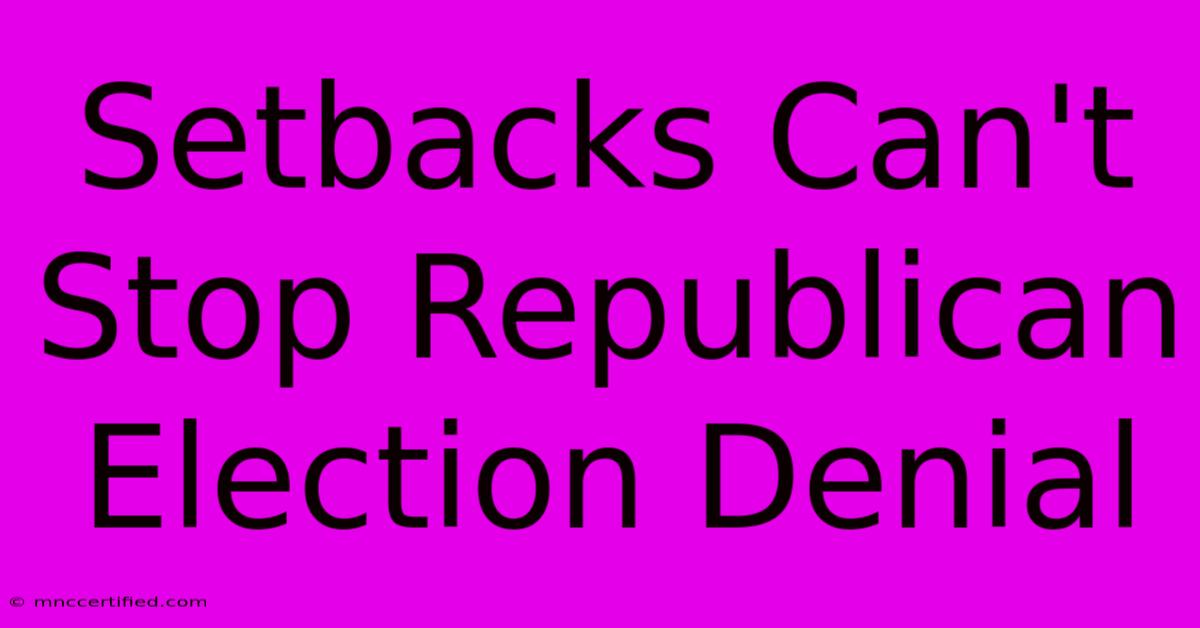Setbacks Can't Stop Republican Election Denial

Table of Contents
Setbacks Can't Stop Republican Election Denial: A Growing Threat to Democracy
The 2020 election was a pivotal moment in American history, not just for the outcome, but for the widespread and persistent claims of voter fraud and election rigging that followed. These claims, largely promoted by Republican politicians and their allies, have not only eroded public trust in the democratic process but have also paved the way for dangerous legislation aimed at restricting voting rights and undermining future elections.
Despite numerous legal challenges and investigations debunking these claims, election denialism remains a potent force within the Republican Party, fueling a wave of voter suppression efforts and creating an environment where future elections are increasingly vulnerable to manipulation and distrust.
The Roots of Election Denial
The roots of this phenomenon lie in the Republican Party's growing embrace of Donald Trump, whose presidency was marked by repeated attacks on the legitimacy of institutions and the spread of misinformation. Trump's claims of a "stolen election" in 2020, despite overwhelming evidence to the contrary, resonated with a significant portion of his base, solidifying a narrative of systemic electoral fraud that continues to reverberate across the political landscape.
This narrative, fueled by right-wing media outlets and social media platforms, has permeated the Republican Party at all levels, with numerous elected officials echoing Trump's claims and actively promoting legislation that restricts access to voting and undermines election integrity.
A Wave of Restrictive Voting Laws
Fueled by the "stolen election" narrative, Republican-controlled legislatures across the country have passed a wave of restrictive voting laws. These laws target specific groups, particularly minority voters, and aim to make it more difficult to register to vote, cast a ballot, and have their votes counted.
Some of the most common restrictions include:
- Stricter voter ID laws: These laws require voters to present specific forms of identification at the polls, which can be difficult for some individuals to obtain.
- Reduced early voting periods: Many states have reduced the number of days available for early voting, making it more difficult for voters to cast ballots before Election Day.
- Restrictions on mail-in voting: Republicans have actively sought to limit mail-in voting, claiming it is vulnerable to fraud. This has disproportionately affected voters who rely on mail-in ballots for convenience or accessibility.
- Purging voter rolls: States have enacted laws that make it easier to remove voters from registration lists, often targeting individuals who have moved or changed their names, even if they have not committed any wrongdoing.
These measures, disguised as efforts to improve election security, are demonstrably aimed at suppressing voter turnout and disenfranchising specific demographics.
The Perpetuation of Election Denial
The continued promotion of election denialism, despite the lack of evidence, has created a dangerous environment where misinformation thrives. This is particularly alarming because it fuels a culture of distrust in the democratic process, making it easier to spread conspiracy theories and undermine the legitimacy of future elections.
Key factors contributing to the perpetuation of election denial include:
- The influence of social media: Platforms like Facebook and Twitter have struggled to effectively combat misinformation and conspiracy theories, allowing false narratives to spread widely.
- The rise of partisan media: Conservative media outlets have largely embraced the "stolen election" narrative, reinforcing the views of their audiences and amplifying the reach of misinformation.
- The politicization of election administration: Republican efforts to control election administration at the state level, including the appointment of partisan officials and the passage of laws restricting election oversight, further undermine public trust in the electoral process.
The Consequences of Election Denial
The consequences of election denial are far-reaching and potentially devastating to American democracy:
- Erosion of public trust: The relentless promotion of baseless claims of election fraud erodes trust in government institutions and the legitimacy of elections, making it more difficult to maintain a peaceful and stable democracy.
- Increased political polarization: Election denialism further exacerbates existing partisan divisions, making it more challenging to find common ground and address shared challenges.
- Violence and extremism: The spread of misinformation and conspiracy theories can fuel violence and extremism, as seen in the January 6th insurrection, where rioters stormed the US Capitol in an attempt to overturn the results of the 2020 election.
Moving Forward: Countering Election Denial
Addressing the threat posed by election denial requires a multi-pronged approach:
- Fact-checking and education: It is crucial to combat misinformation through robust fact-checking efforts and educational initiatives that promote media literacy and critical thinking skills.
- Protecting voting rights: States must prioritize protecting access to voting and ensuring that all eligible voters can cast their ballots without undue interference.
- Strengthening election security: It is essential to invest in election security measures to safeguard against foreign interference and other threats to election integrity.
- Holding elected officials accountable: Elected officials who promote election denial and undermine the democratic process must be held accountable for their actions.
The future of American democracy hinges on the ability to counter the spread of election denialism and protect the integrity of the electoral process. This will require a collective effort from individuals, communities, and institutions to promote truth, transparency, and a commitment to free and fair elections.

Thank you for visiting our website wich cover about Setbacks Can't Stop Republican Election Denial . We hope the information provided has been useful to you. Feel free to contact us if you have any questions or need further assistance. See you next time and dont miss to bookmark.
Featured Posts
-
Washington Lieutenant Governor Race 2024 Results
Nov 07, 2024
-
Bizarre Twist Bayern Munichs Champions League Opener
Nov 07, 2024
-
How To Add Pulsechain Network To Metamask
Nov 07, 2024
-
Why Do I Need A Surety Bond For An Estate
Nov 07, 2024
-
Trumps Return 4 Things Ny Lawmakers Must Do
Nov 07, 2024